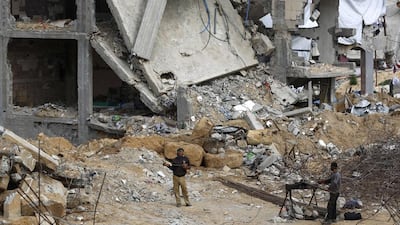Having failed to protect the civilians of Gaza in July and August last year, the international community seemed poised to make amends by working to rebuild the Strip. But despite pledges of billions of dollars, only $100m in aid had reportedly arrived by the start of this year. That’s just about two per cent of the promised amount.
Hardly any of the 96,000 houses damaged or destroyed during the conflict have been restored, leaving tens of thousands to face one of the harshest winters in years. Little has been done by the international community to put pressure on Israel and Egypt to ease the blockade on Gaza. The Israeli border crossings remain closed to all but a small trickle of aid and the Egyptian authorities’ recent decision to open the Rafah crossing for three days provided only very temporary relief.
Israel enforces “no-go zones” as a security buffer – a 6-kilometre fishing cordon and 1km of farmland along the border fence – and terrible tragedies often happen there with numerous instances of Israeli soldiers firing on fishermen and other civilians in those areas.
As the days and months pass with little or no reconstruction, ordinary Gazans’ frustrations continue to mount. It is all too easy to imagine a spark igniting yet another conflict, leading to yet another humanitarian disaster, an endlessly violent cycle.
The hopelessness and injustices have led many young Muslims in Europe and North America to express their anger and disappointment with the western world’s hypocrisy and double standards on the Israeli-Palestinian conflict. After the Charlie Hebdo massacre, it is important to remember that among the main reasons for Muslim disaffection and radicalisation in the West is the decades of injustice visited upon the Palestinians in full view of the international media.
Today, in the shadow of ISIL, Al Qaeda and the Taliban, it is fashionable to disassociate the Israeli-Palestinian conflict from the rise of Islamic radicalism in the West. However, the mere fact that Ahmed Coulibaly – a friend of fellow Frenchmen Said and Cherif Kouachi, who carried out the Charlie Hebdo attacks – chose a kosher supermarket as his target, is a stark reminder of the centrality of this conflict.
The “Je Suis Charlie” message from Europe is not just about freedom of speech, but also about upholding core values that revolve around the universal application of human rights and dignity. While Sweden has taken the courageous step of recognising a Palestinian state, it is time for the rallying cry “Je Suis Gaza” to spur a renewed effort to move the stalled reconstruction process forward. This would send a strong message that Europe does not tolerate the targeting of any civilians in any way, whether it is magazine cartoonists or a siege that is leaving 1.8 million people on the Strip to slowly starve.
It is clear that the reconstruction mechanism proposed by Robert Serry, UN special coordinator for the Middle East peace process, to ease the blockade while ensuring Israel’s security has not worked. Its failure led Oxfam to recently admit that the arrangement “has had little or no positive effect on people’s lives so far”. Oxfam has also described the quantity of construction materials allowed to enter the Strip as no more than “a drop in the bucket”. That is true because the materials currently being allowed in are just four per cent of pre-war levels.
It is time to consider a new approach then, even as we accept that it has to address Israeli security concerns while making Gaza’s critical needs a priority. Reconstruction would be a chance to facilitate Palestinian unity.
Any new approach needs to be based on greater collaboration and transparency about the process, all the better to dispel the notion that security measures are merely a means for Israel to gather intelligence.
Transparency would help end some of the bickering between Hamas and Fatah over control of the reconstruction process. Any new approach would have to allow the Palestinian Authority to take control of the borders to help restore its legitimacy in the eyes of the local population. The idea for a collaborative council for the reconstruction of Gaza – first put forward in a Brookings’ policy briefing, is one such attempt to think outside the box.
Ultimately, of course, there can be no change without the requisite international will. But renewed engagement with the reconstruction of Gaza would not only alleviate much suffering in the Strip, it would uphold basic principles of humanity and justice for all. It would probably do more to pre-empt the radicalisation of some European Muslims than some of the most sophisticated propaganda and intelligence and infiltration campaigns.
Sultan Barakat is a senior fellow at the Brookings Institution in Washington and director of research at the Brookings Doha Centre in Qatar. He is the founding chairman of the post-war reconstruction and development unit at the University of York, UK

